Variable
Overview and Key Concepts
This shared asset allows you to store any kind of data and then read or change that data.

The Variable is unlike the other shared assets in that it isn't a limited asset. Tokens can read and set a Variable freely without any delay or interruption. The Variable can be used just like a label on a token or other object but now you have a central reference to that value that can be easily accessed throughout your process flow. Additionally you get the added feature of being able to listen to the Variable being changed or even when it is read.
A Variable is changed by a Set Variable activity and read by a Get Variable activity.
Variable Values
The Variable is very flexible in what it can point at or what its value can be. Here are some possibilities:
- Number - If a number is entered into the Variable or Value box, this will be the initial value of the variable on reset. The value of the Variable is stored internally. You can change the value to another number or even change the value to a string, object, array etc.
- String - Behaves the same as a Number.
- Array - Behaves the same as a Number.
- Object - Behaves the same as a Number.
- Node - If the Variable or Value box references a node with data on it, then the value will be the value of the node. When you set the Variable, the value of the node will be set. As with the number, you can set the Variable to a number, string, object etc. and then value of the node will reflect the new value.
- Tracked Variable - You can reference a Global Tracked Variable, a tracked variable stored on a node or table cell or you can create an Internal Tracked Variable. Internal Tracked Variables that have their Type set to Local will create a variable for each instance of the process flow.
- Table Cell - Behaves the same as a node. For
example:
Table("GlobalTable1").cell(1, 1) - Table Value - If you get the value from a table
using
Table("GlobalTable1")[1][1]then the Variable will use this as the initial value and store it internally. This will behave just like a Number. Setting the Variable will only set the internal value and will not alter the value in the table. - Global Variable - You can reference a Global
Variable by using the
 and sampling
the global variable from the Toolbox. This will give a reference to the Global
Variable's definition in the MODEL:/Tools/GlobalVariables folder. Getting the value of
the Variable will get the current value of the global variable. Setting the value will
set the Global Variable. NOTE: Using a Wait for Event or Event-Triggered Source on a
Variable that is referencing a Global Variable will not allow you to listen to the
Global Variable being set using code. It will only listen to changes that occur using
the Set Variable activity.
and sampling
the global variable from the Toolbox. This will give a reference to the Global
Variable's definition in the MODEL:/Tools/GlobalVariables folder. Getting the value of
the Variable will get the current value of the global variable. Setting the value will
set the Global Variable. NOTE: Using a Wait for Event or Event-Triggered Source on a
Variable that is referencing a Global Variable will not allow you to listen to the
Global Variable being set using code. It will only listen to changes that occur using
the Set Variable activity. - Emulation Connection - You can reference an Emulation Connection or create an Internal Emulation Connection. Internal Emulation Connections that have their Type set to Local will create a variable for each instance of the process flow. For more information on Emulation Connections see the Emulation topic.
- Emulation Variable - You can reference an Emulation Variable or create an Internal Emulation Variable. Internal Emulation Variables that have their Type set to Local will create a variable for each instance of the process flow. For more information on Emulation Variables see the Emulation topic.
Connectors
Only Get Variable and Set Variable activities can be connected to a Variable. See Adding and Connecting Activities for more information.
Properties
The following image shows properties for the Variable shared asset:
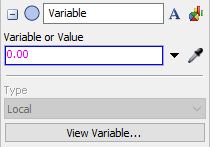
Each of these properties will be explained in the following sections.
Name
Used to change the name of the activity. See Name for more information about this property.
Font
The Font button
 opens a window to edit the activity's
background color and font properties. See
Font for more information
about this property.
opens a window to edit the activity's
background color and font properties. See
Font for more information
about this property.
Statistics
The Statistics button
 opens the activity's statistics
window. See Statistics
for more information about this property.
opens the activity's statistics
window. See Statistics
for more information about this property.
Variable or Value
This box will only be evaluated on reset. See the Overview and Key Concepts section above for more information.
Type
Variables can be defined globally or locally. If the Variable is in a general process flow or connected to an object, table cell, global variable or other node, the Variable will be globally available and this property will be unavailable. Otherwise, it can be set to Local so only tokens in the same Process Flow instance will be using the same Variable.
View Variable...
Opens a viewer window displaying the current value of the Variable.

Internal Variable Properties
The following variables can set to Internal which will create a new variable for each instance of the process flow if its type is set to Local.
Internal Tracked Variable
If the option Internal Tracked Variable is selected from the drop down of the Variable or Value box, the properties will change to:
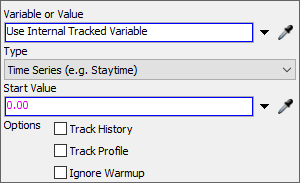
These properties allow you to define what type of tracked variable is used, what its initial value is on reset, and various options for the tracked variable.
The View Variable... will also display a different viewer:

Internal Emulation Connection
If the option Internal Emulation Connection is selected from the drop down of the Variable or Value box, the properties will change to:
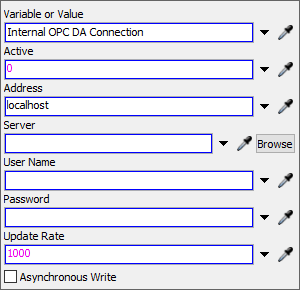
The properties for the internal connection are the same as in the Emulation tool. For information about these properties, see the Emulation page.
Internal Emulation Variable
If the option Internal Emulation Variable is selected from the drop down of the Variable or Valuee box, the properties will change to:
Allen-Bradley Tag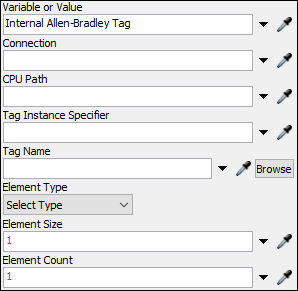
The properties for the internal variable are mostly the same as in the Emulation tool. For information about these properties, see the Emulation page.
The Allen-Bradley Tag variable has one added property:
- Tag Instance Specifier - The tag instance specifier is most useful when the variable is set to the Local type. The string defined by this box can be inserted anywhere in the Tag Name box by using %s in the Tag Name string.
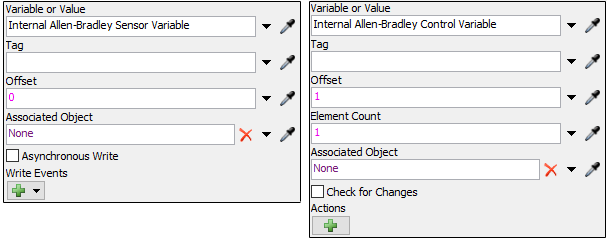
The properties for the internal variable are the same as in the Emulation tool. For information about these properties, see the Emulation page.
Modbus Register (Sensor and Control)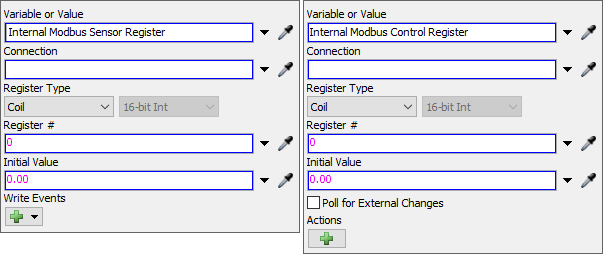
The properties for the modbus register internal variable are the same as in the Emulation tool. For information about these properties, see the Emulation page.
OPC DA Tag (Sensor and Control)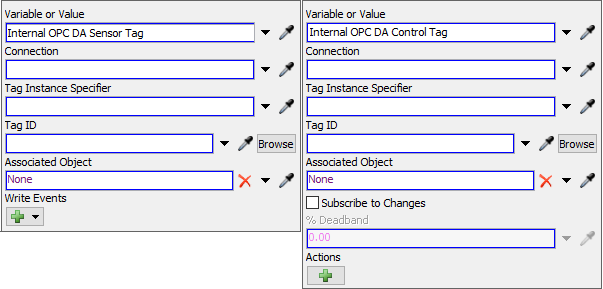
The properties for the internal variable are mostly the same as in the Emulation tool. For information about these properties, see the Emulation page.
The OPC Tag variable has one added property:
- Tag Instance Specifier - The tag instance specifier is most useful when the variable is set to the Local type. The string defined by this box can be inserted anywhere in the Tag ID box by using %s in the Tag ID string.
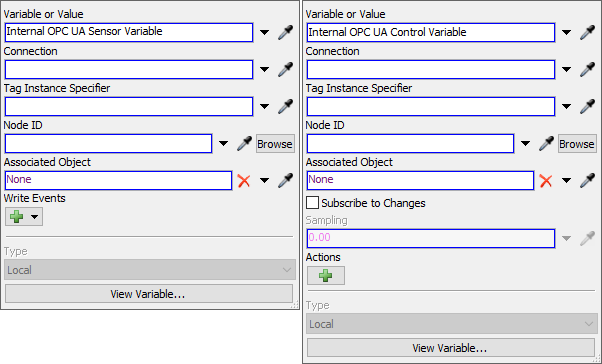
The properties for the internal variable are mostly the same as in the Emulation tool. For information about these properties, see the Emulation page.
The OPC UA variable has one added property:
- Tag Instance Specifier - The tag instance specifier is most useful when the variable is set to the Local type. The string defined by this box can be inserted anywhere in the Tag ID box by using %s in the Tag ID string.